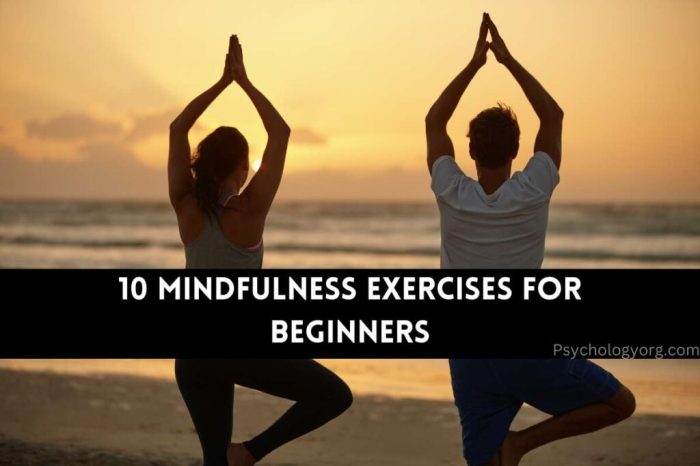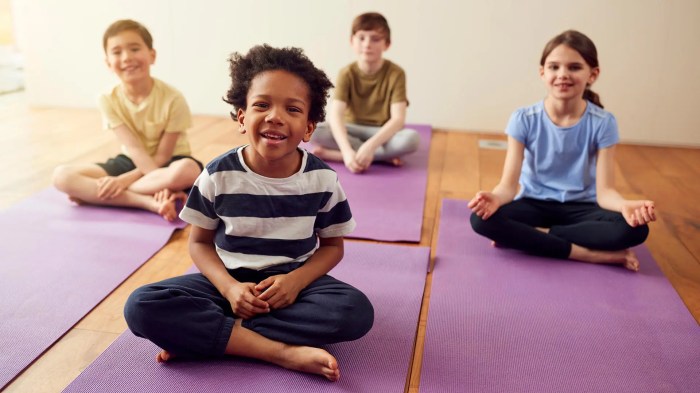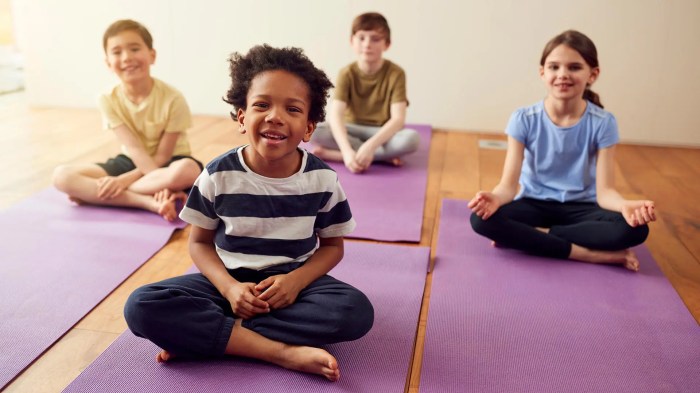Mindfulness Exercises: Get ready to dive into the world of mindfulness exercises, where deep breathing, body scans, and mindful walking await to elevate your well-being to new heights.
Introduction to Mindfulness Exercises
Mindfulness exercises are practices that help individuals focus on the present moment while calmly acknowledging and accepting their feelings, thoughts, and bodily sensations. By engaging in mindfulness exercises, individuals can cultivate a sense of awareness, reduce stress, and improve their overall well-being.
Benefits of Practicing Mindfulness Exercises
- Reduced stress and anxiety levels
- Improved focus and concentration
- Enhanced emotional regulation
- Increased self-awareness and acceptance
Examples of Mindfulness Exercises
There are various mindfulness exercises that individuals can incorporate into their daily routine to promote mindfulness and presence. Some examples include:
- Deep Breathing: Taking slow, deep breaths to center yourself and focus on the present moment.
- Body Scan: Paying attention to each part of your body, from head to toe, to notice any tension or sensations present.
- Mindful Walking: Being fully present and aware while walking, noticing each step and the sensations in your body.
Types of Mindfulness Exercises
When it comes to mindfulness exercises, there are several different types that can help you cultivate a sense of presence and awareness in your daily life. Let’s explore some of the most popular ones and how they can benefit you.
Meditation
Meditation is a practice that involves focusing your mind and eliminating distractions to achieve a state of mental clarity and emotional calm. This can be done through various techniques such as breath awareness, loving-kindness meditation, or body scan meditation. Meditation can help reduce stress, improve concentration, and promote overall well-being.
Yoga
Yoga combines physical postures, breathing exercises, and meditation to promote mindfulness and relaxation. By syncing movement with breath, yoga helps you stay present in the moment and connect with your body. Some beginner-friendly yoga poses include Child’s Pose, Downward Dog, and Mountain Pose, while advanced practitioners may try more challenging poses like Crow Pose or Headstand.
Tai Chi
Tai Chi is a gentle form of martial arts that involves slow, flowing movements and deep breathing. This practice can help improve balance, flexibility, and mental focus. Tai Chi is suitable for all fitness levels, making it a great option for beginners looking to start a mindfulness exercise routine. Advanced practitioners may explore more complex Tai Chi routines to deepen their practice.
Mindfulness Techniques and Practices
When it comes to mindfulness techniques and practices, there are various methods that individuals can explore to enhance their self-awareness and emotional regulation. These techniques can also be integrated into daily routines for improved mental well-being.
Focused Attention Meditation
- Focus on a specific object, thought, or sensation.
- Redirect your attention back to the focal point when distractions arise.
- Enhances concentration and awareness of the present moment.
Open Monitoring Meditation
- Observe thoughts, emotions, and sensations without judgment.
- Develops a non-reactive awareness of internal experiences.
- Increases insight into one’s mental processes.
Loving-Kindness Meditation
- Cultivate feelings of compassion and kindness towards oneself and others.
- Repeat phrases of well-wishes and goodwill for emotional well-being.
- Promotes empathy, connection, and positivity in relationships.
By practicing these mindfulness techniques, individuals can enhance their self-awareness by observing their thoughts, emotions, and reactions without judgment. This increased awareness can lead to better emotional regulation, allowing individuals to respond to situations with more clarity and composure.
Integrating mindfulness practices into daily routines, such as setting aside time for meditation, deep breathing exercises, or mindful walks, can help individuals manage stress, improve focus, and cultivate a sense of inner peace. Consistency and commitment to these practices are key to reaping the benefits of mindfulness for mental well-being.
Mindfulness Exercises for Stress Reduction

When it comes to reducing stress and anxiety levels, mindfulness exercises can be incredibly effective. By practicing mindfulness, individuals can learn to focus on the present moment, acknowledge their thoughts and feelings without judgment, and ultimately reduce the impact of stressors on their mental well-being.
Step-by-Step Guide for Practicing Mindfulness Exercises during Stressful Situations
- Find a quiet and comfortable space where you can sit or lie down without distractions.
- Close your eyes and take a few deep breaths, focusing on the sensation of air entering and leaving your body.
- Bring your attention to the present moment by noticing the sounds, smells, and sensations around you.
- Shift your focus to your thoughts and emotions, observing them without judgment or attachment.
- Engage in deep breathing exercises or progressive muscle relaxation to release tension and promote relaxation.
- Repeat positive affirmations or mantras to cultivate a sense of calm and positivity.
- Practice gratitude by reflecting on things in your life that bring you joy and appreciation.
- Conclude the exercise by slowly bringing your awareness back to the present moment and opening your eyes.
Personal Experiences with Stress Reduction through Mindfulness Practices
Many individuals have shared success stories of how mindfulness exercises have helped them cope with stress and anxiety. By incorporating mindfulness into their daily routines, they have noticed a significant decrease in their stress levels, improved emotional regulation, and a greater sense of overall well-being. These personal experiences serve as a testament to the powerful impact of mindfulness on stress reduction.
Mindfulness Exercises for Improved Focus and Concentration

Mindfulness exercises play a crucial role in enhancing focus, attention span, and cognitive performance. By incorporating mindfulness into daily routines, individuals can experience improved concentration levels and heightened productivity.
Techniques to Improve Concentration, Mindfulness Exercises
- Mindful Breathing: Focus on your breath, observing its rhythm and flow. This practice helps anchor your attention to the present moment, reducing distractions and improving concentration.
- Body Scan: Slowly scan your body from head to toe, noticing any sensations or tension. This technique promotes awareness of physical sensations, aiding in relaxation and enhancing focus.
Impact on Productivity
Mindfulness practices have been shown to increase cognitive flexibility, problem-solving abilities, and overall mental clarity. By cultivating mindfulness, individuals can approach tasks with a clear and focused mind, leading to improved efficiency and productivity.
